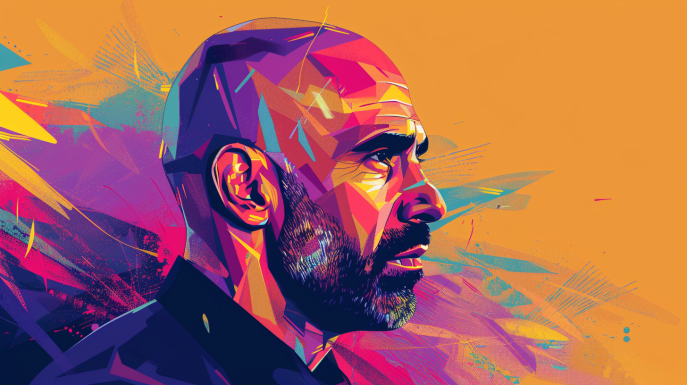In football, certain names stand out for their contributions on the pitch and their ability to revolutionize the game from the sidelines. One such name is Pep Guardiola, a mastermind whose coaching prowess has set new benchmarks in modern football. Pep Guardiola is widely regarded as one of the greatest football coaches ever. His innovative tactics, attention to detail, and commitment to player development have revolutionized the game. Guardiola has achieved remarkable success with clubs such as Barcelona, Bayern Munich, and Manchester City, winning numerous domestic and international titles.
This article will delve into Guardiola’s early life and career in football, his rise as a world-class coach, his tactical philosophy and influences, his impact on English football during his time at Manchester City, his leadership style and management techniques, his successes and failures in European competitions, his impact on youth development and academy systems, his plans and ambitions in football, and finally, his legacy and contributions to the evolution of modern football coaching.
Pep Guardiola’s Early Life and Career in Football
Pep Guardiola was born on January 18, 1971, in Santpedor, Catalonia, Spain. From a young age, he showed a passion for football and quickly developed his skills on the pitch. Guardiola joined Barcelona’s youth academy, La Masia, at 13. Under the guidance of Johan Cruyff, the manager of Barcelona at the time, Guardiola learned the importance of possession-based football and developed a deep understanding of the game.
Guardiola’s playing career began with Barcelona B in 1990. He quickly made an impact and was promoted to the first team in 1990. Guardiola played as a defensive midfielder and became an integral part of Johan Cruyff’s “Dream Team,” which won four consecutive La Liga titles from 1991 to 1994. He was known for his exceptional passing ability and tactical intelligence on the field.
The Rise of Pep Guardiola as a World-Class Coach
After retiring as a player in 2006, Guardiola seamlessly transitioned into coaching. He started his coaching career with Barcelona B in 2007 and led the team to promotion to the Segunda Division in his first season. Guardiola’s success with Barcelona B caught the attention of the club’s hierarchy, and he was appointed the first team coach in 2008.
Guardiola’s tenure as Barcelona’s coach from 2008 to 2012 was extraordinary. Under his guidance, Barcelona played a mesmerizing brand of possession-based football known as tiki-taka. The team won six unprecedented trophies in 2009, including the UEFA Champions League, La Liga, and the Copa del Rey. Guardiola’s Barcelona side dominated European football and became one of the greatest teams in history.
In 2013, Guardiola took over as the head coach of Bayern Munich. He continued his success at the German club, winning three consecutive Bundesliga titles from 2013 to 2016. However, Guardiola’s time at Bayern Munich was marred by disappointments in the UEFA Champions League, failing to win the competition during his tenure.
In 2016, Guardiola made his move to Manchester City. He inherited a talented squad but faced the challenge of transforming their playing style and implementing his tactical philosophy. Guardiola’s impact on English football was immediate, as Manchester City won the Premier League title in his second season with a record-breaking 100 points. Guardiola’s Manchester City side played an attacking and possession-based style of football that was a joy to watch.
Guardiola’s Tactical Philosophy and Influences
Guardiola’s tactical philosophy is centered around possession-based football and high pressing. His teams prioritize ball retention and use quick passing and movement to break down opposition defenses. This style of play, known as tiki-taka, was heavily influenced by Johan Cruyff’s “Total Football” philosophy.
Cruyff, Guardiola’s mentor and coach at Barcelona, instilled in him the importance of positional play, intelligent movement, and quick passing. Guardiola took these principles and added his own innovations to create a unique play style emulated by many teams worldwide.
In addition to Cruyff, Guardiola has been influenced by other coaches such as Marcelo Bielsa and Louis van Gaal. Bielsa’s high-intensity pressing and attacking style have significantly impacted Guardiola’s coaching philosophy. Van Gaal, Guardiola’s coach at Barcelona, taught him the importance of discipline and tactical organization.
The Manchester City Era: Guardiola’s Impact on English Football
Guardiola’s arrival at Manchester City in 2016 marked a turning point in English football. His commitment to possession-based football and attacking play revolutionized how teams approached the Premier League game.
Under Guardiola’s guidance, Manchester City won the Premier League title in the 2017-2018 season with a record-breaking 100 points. The team played with a fluidity and creativity unmatched by their rivals. Guardiola’s emphasis on positional play and quick passing allowed Manchester City to dominate possession and control games.
In addition to their success in the Premier League, Guardiola’s Manchester City also succeeded in domestic cup competitions. They won the FA Cup in 2019 and the League Cup in 2018, 2019, and 2020. Guardiola’s ability to consistently deliver silverware has solidified his status as one of the greatest coaches ever.
Guardiola’s Leadership Style and Management Techniques

Guardiola is known for his meticulous attention to detail and relentless pursuit of perfection. He strongly emphasizes player development and improvement, constantly pushing his players to reach their full potential.
Guardiola’s management techniques are centered around communication and relationship-building. He takes the time to understand each player’s strengths and weaknesses and tailors his coaching approach accordingly. Guardiola’s ability to connect with his players personally has been instrumental in getting the best out of them.
In addition to his focus on player development, Guardiola is also a master tactician. He spends countless hours analyzing opponents and devising strategies to exploit their weaknesses. Guardiola’s ability to adapt his tactics based on the opposition has been a key factor in his success.
Guardiola’s Relationship with Players and Staff
Guardiola’s relationship with his players and staff is characterized by trust and respect. He creates an environment where players feel empowered and supported, allowing them to express themselves on the field.
There have been numerous examples of positive interactions between Guardiola and his players. He has been praised for his ability to motivate and inspire his team, often giving passionate team talks before matches. Guardiola’s belief in his players’ abilities has instilled confidence and allowed them to perform at their best.
However, there has also been tension between Guardiola and certain players or staff members. His demanding nature and high expectations can sometimes lead to conflicts. Nevertheless, Guardiola’s ability to resolve these conflicts and maintain strong relationships with his players and staff has been a testament to his leadership skills.
Guardiola’s Successes and Failures in European Competitions
While Guardiola has achieved great success in domestic competitions, his record in European competitions has been more mixed. He won the UEFA Champions League twice with Barcelona in 2009 and 2011 but has struggled to replicate that success with Bayern Munich and Manchester City.
At Bayern Munich, Guardiola reached the semi-finals of the Champions League three times but failed to progress further. His tactical decisions and team selections were scrutinized during these campaigns, with some critics suggesting that he overcomplicated his approach in key matches.
Similarly, Guardiola’s time at Manchester City has been marked by disappointments in the Champions League. Despite dominating English football, Manchester City has struggled to make a deep run in Europe’s premier club competition. Guardiola’s tactical decisions and team selections have been questioned several times, leading to early exits from the tournament.
Guardiola’s Impact on Youth Development and Academy Systems
One of Guardiola’s greatest contributions to football has been his emphasis on youth development and integrating young players into the first team. He believes in giving young players opportunities to prove themselves and has a track record of nurturing talent.
At Barcelona, Guardiola oversaw the rise of several young players from the club’s renowned La Masia academy. Players like Lionel Messi, Sergio Busquets, and Pedro Rodriguez were given their first-team debuts under Guardiola and became key figures in Barcelona’s success.
Guardiola has continued this approach at Manchester City, promoting young players from the club’s academy and giving them opportunities to shine. Phil Foden, who came through the ranks at Manchester City, has flourished under Guardiola’s guidance and is now considered one of the brightest young talents in English football.
Guardiola’s Future Plans and Ambitions in Football
Despite his numerous successes, Guardiola remains hungry for more. He has expressed his desire to continue coaching and improving as a coach. Guardiola constantly looks for ways to evolve his tactics and stay ahead of the game.
As for his plans, Guardiola has hinted that he may be interested in coaching a national team at some point in his career. He has admired Italian football and has not ruled out the possibility of coaching in Serie A.
Regardless of where he ends up next, Guardiola’s ambition and commitment to the game ensure he will continue to leave a lasting impact on football.
The Legacy of Pep Guardiola: Contributions to the Evolution of Modern Football Coaching
Pep Guardiola’s impact on football coaching and tactics cannot be overstated. His innovative approach to the game has revolutionized how teams play and influenced coaches worldwide.
Guardiola’s possession-based football and tiki-taka style have become synonymous with his name. Many teams have tried to replicate his tactics, with varying degrees of success. Guardiola’s ability to implement his philosophy and get his players to buy into his ideas is a testament to his coaching prowess.
In addition to his tactical innovations, Guardiola’s emphasis on player development and youth integration has profoundly impacted the sport. He has shown that young players can thrive in high-pressure environments with the opportunity and support.
Guardiola’s influence can be seen in the success of other coaches who have worked under him or been inspired by his methods. Coaches such as Luis Enrique, Tito Vilanova, and Mauricio Pochettino have all been influenced by Guardiola’s coaching philosophy and have gone on to achieve success in their own right.
Pep Guardiola’s career as a player and coach has profoundly impacted football coaching and tactics. His innovative approach to the game, commitment to player development, and attention to detail have revolutionized the sport.
From his early days at Barcelona to his current tenure at Manchester City, Guardiola has consistently achieved success and pushed the boundaries of what is possible in football. His tactical philosophy, influenced by Johan Cruyff and other great coaches, has become a blueprint for success.
As Guardiola continues his coaching journey, it will be fascinating to see how he continues to evolve and leave his mark on the sport. His legacy as one of the greatest coaches of all time is already secure, but there is no doubt that he will continue to push the boundaries of what is possible in football coaching.
If you’re a football enthusiast and a fan of Pep Guardiola, you won’t want to miss out on the latest article from Coach Watch. In their recent piece titled “The Tactical Genius of Pep Guardiola: A Closer Look,” they delve into the strategic brilliance of the renowned coach. This article analyzes Guardiola’s coaching style in-depth, From innovative formations to meticulous attention to detail. To read more about it, click here.






